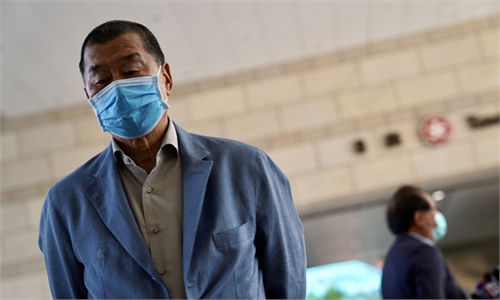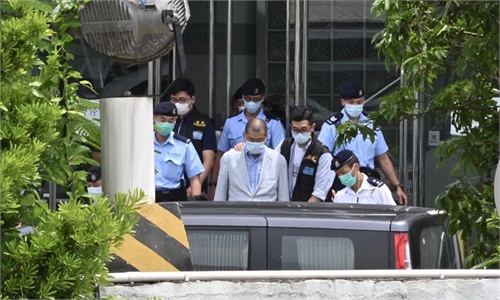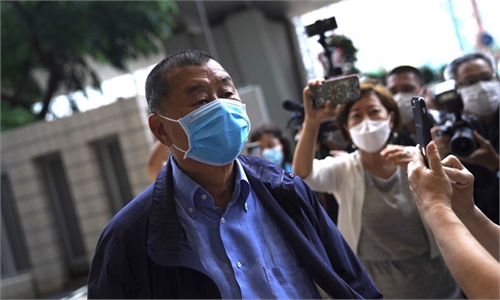Seeing Jimmy Lai as 'freedom fighter' is naïve thinking, fails to listen to true voice of HKers
Seeing Jimmy Lai as ‘freedom fighter’ is naïve thinking, fails to listen to true voice of HKers
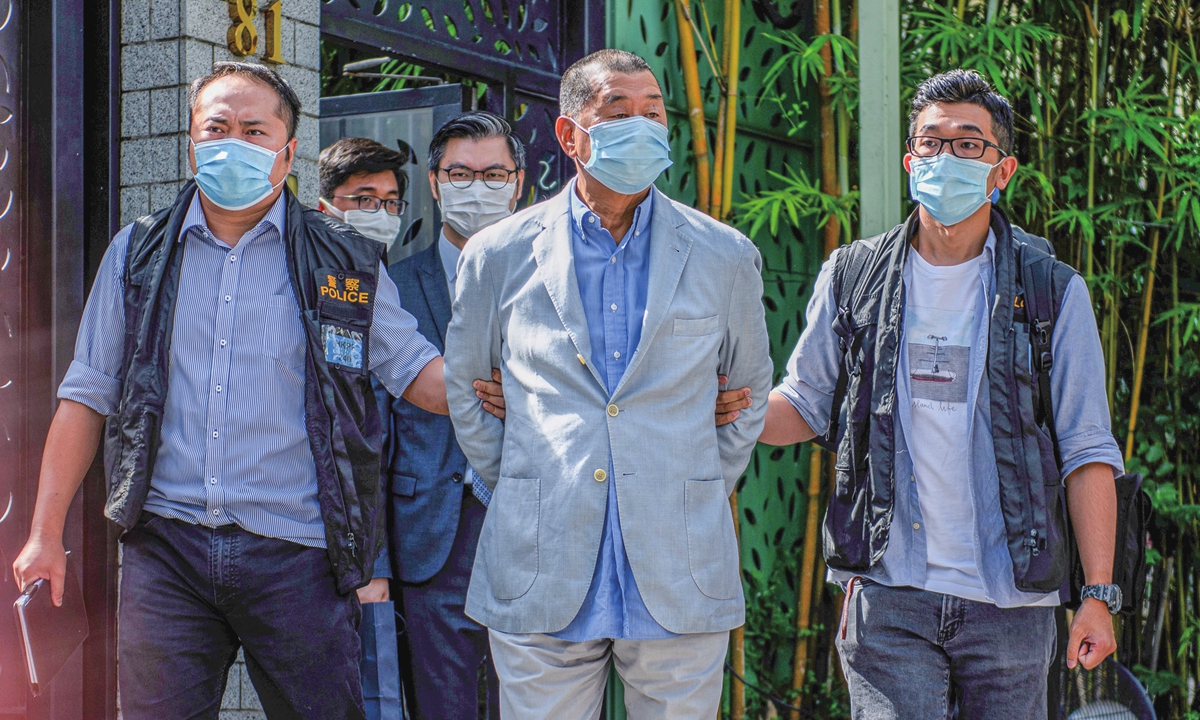
Hong Kong police lead Jimmy Lai Chee-ying, one of the most high-profile Hong Kong secessionists, away from his home after he was arrested on Monday under the new national security law for Hong Kong. Photo: AFP
Attempts in the West to picture Jimmy Lai and his infamous Apple Daily as the spiritual leader of the so-called free press are naïve, as Lai is not even accepted by Hong Kong residents, who only see him as a "modern traitor" rather than a "freedom fighter."
Following a high-profile operation on Monday that led to the arrest of key figures in Hong Kong for endangering national security, including Lai, founder of the Apple Daily, and some senior executives of the media group, some opposition groups, along with anti-China forces and foreign politicians, have been voicing concerns over the arrests, seeking to arouse sympathy among the global community to continue support for the anti-government movement while criticizing "erosion" of media freedom.
Some local journalists shared photos of Apple Daily employees sticking to their posts until midnight to finalize the outline of Tuesday's paper, while others showed footage of local people lining up at newsstands at 2 am to get print copies of the newspaper in order to show "support" for Lai and other anti-government figures detained by the police.
However, such "showing off" is seen as a commonly displayed "stunt" to attract public attention, some local residents said.
Lai, who is usually called "fat Lai" or "Marijuana Lai," has an infamous reputation among ordinary Hong Kong residents, who remember the 71-year-old riot supporter as the most aggressive anti-China figure who instigated violent protests, short bought Hong Kong stocks ahead of the anti-government movement in 2014, colluded with foreign politicians and even made a plea for reckless interference from foreign countries in Hong Kong's affairs.
Some American hawks and other foreign politicians who have been meddling or trying to interfere in Hong Kong's affairs also bad-mouthed the Monday arrests. US Secretary of State Mike Pompeo said he was "deeply troubled by reports of the arrest of Lai…" and claimed that this was further proof that the Communist Party of China has "eviscerated Hong Kong's freedoms and eroded the rights of its people."
Pompeo has repeatedly made mistaken remarks over Hong Kong issues and false accusations against China's legitimate efforts to safeguard its national security under the law, Zhao Lijian, spokesperson of the Chinese Foreign Ministry, told a routine press briefing on Tuesday. "These political lies have no factual basis," he said.
However, these long-term anti-China Western politicians who have been trying to "have a say" in the country's internal affairs have become ridiculous, as they failed to understand what the Hong Kong majority think about Lai and that Apple Daily is in fact an evil bridge between local secessionists and foreign forces, some observers said.
"Just ask anyone in Hong Kong, 'Who is the biggest traitor of Hong Kong?' people will tell you: Jimmy Lai," Tsuen Wan former district councillor Nixie Lam told the Global Times on Tuesday.
There was only one word to describe Apple Daily: fake, she said, referring to countless stories and eye-catching headlines that the paper has run in order to smear the Hong Kong Special Administrative Region (HKSAR) government and the Chinese mainland, instigate hatred against the Hong Kong police and spread rumors about China.
Lai had been arrested several times over the past year on suspicion of violating local regulations. But he had also been granted bail several times. Under the national security law for Hong Kong, some legal experts believe that this might not be the case anymore and the prominent anti-China figure would face much more severe punishment, even the possibility of life imprisonment could not be ruled out.
Black hands
New details revealed by the Hong Kong Police Force (HKPF) showed that following the arrests of 10 people on Monday, police found that a group in charge of propaganda was calling on foreign countries to impose sanctions on Hong Kong and even block off the city. Two of the men and one woman who were arrested were in charge of the group's operations, which included using overseas bank accounts of Apple Daily executives to financially support the group.
Along with Lai's arrest, at least 9 people have also been arrested on suspicion of colluding with foreign forces to endanger national security, including certain senior executives from Apple Daily and one of Lai's aides, Mark Simon.
Simon reportedly had stints with US naval intelligence and the CIA, who might have been serving as middlemen in helping to collect US-related funds for the political movement in Hong Kong, according to some observers.
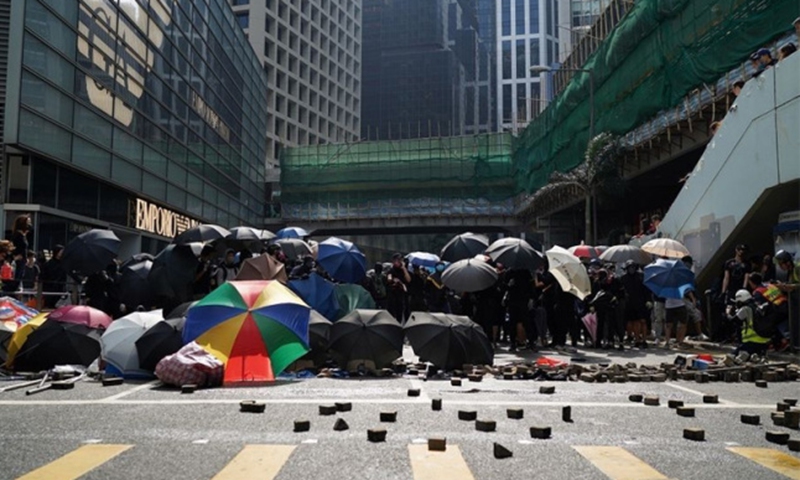
Rioters block the traffic in Central District of China's Hong Kong, Nov. 12, 2019. Photo:Xinhua
While some Western and local Hong Kong media considered the arrests and search of the media outlet's headquarters as an "erosion" of free press, observers said Apple Daily can't be simply taken as an ordinary news organization given it has been playing its role in fueling anti-government social movements in Hong Kong, and reportedly secretly connecting with foreign powers.
"Apple Daily cannot be seen as a media outlet that is critical of the government, because it represents a certain political power that is closely connected with external forces and actively engages in political battles in Hong Kong," Lau Siu-kai, vice-president of the Chinese Association of Hong Kong and Macao Studies, said Monday.
The HKPF had sent many letters to Apple Daily regarding its biased and fake reporting of law enforcement amid the social turmoil. For example, in December 2019, a total of 16 letters were sent to Apple Daily to express strong dissatisfactions over biased or even fake reports that aimed to arouse anti-police sentiment in Hong Kong, according to public records. Even when black-clad rioters besieged the Hong Kong Polytechnic University in November 2019, turning the campus into a war zone by clashing with police and endangering the lives of students, Apple Daily ran a front page slogan condemning law enforcement procedures, while other local newspapers all ran headlines like "Vote to reject violence."
"Almost every day, Apple Daily has been instigating public hatred toward the HKSAR government and the mainland. Almost every report [the newspaper runs] on the mainland deliberately exaggerates the gap between the mainland and HK," Lawrence Tang Fei, a member of the Chinese Association of Hong Kong and Macao Studies, told the Global Times on Monday, "And all these smearing tactics are not secret."
The newspaper, supported by some anti-China politicians in the West, lacks professionalism and ethics, and plays the role of brainwashing the younger generation in Hong Kong, observers noted.
In 2019, on several occasions, Global Times reporters witnessed the so-called journalists from Apple Daily closely communicate with black-clad rioters during anti-government protests, help them escape from police operations and even verbally attack police officers on the scene.
Apple Daily was launched in 1995 through an aggressive dumping strategy to gain market share, and its parent company Next Digital has lost over HK$1.9 billion in the past five years and a cumulative HK$2.7 billion over a period of 10 years, Angelo Giuliano, a veteran business representative and Hong Kong affairs observer, told the Global Times on Tuesday.
"This clearly shows that this venture exists more as a propaganda tool than for a business-profitability purpose," he said, noting that there is an evil link between Lai, Apple Daily and Taiwan's separatist Democratic Progressive Party.
When some Hong Kong people said that Apple Daily also helped fuel the propaganda campaign during the months-long social turmoil in 2019 by designing and dispatching posters and banners such as "Fight for Freedom, Stand With Hong Kong" online and offline, and even ran posts instigating hatred and secessionism on social networks such as LIHKG and Telegram, Giuliano, who witnessed the anti-government movement, said he was not surprised at all.
"With the implementation of the national security law [for Hong Kong], I am confident that now it will help unveil some dirty stuff," he said.
While some Western media like BBC and the New York Times see Apple Daily as a Hong Kong newspaper defying the "crackdown" and the operation as undermining press freedom, some observers ridicule such hypocrisy, and seeing a propaganda machine, which is sometimes seen as a political tool, as a real newsroom just lowers the standards of journalism.
"Freedom of the press does not mean the media has the freedom to violate the law," Tang said, noting that it's also commonly seen in Western countries that media outlets comply with local laws and regulations.

